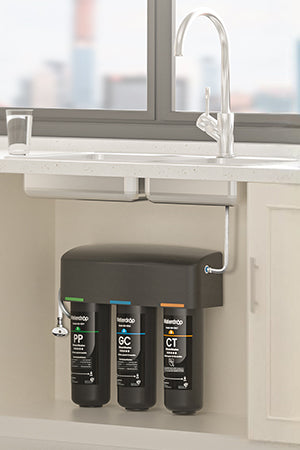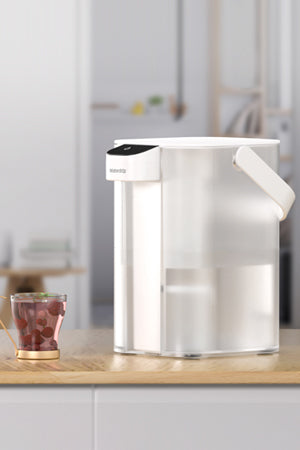The low calorie content in coconut water makes it a popular healthy drink among humans. If you’re a pet owner who enjoys coconut water, then you’re wondering if it's safe to share it with your dogs.
This brings us to the all-important question: Can dogs drink coconut water? The short answer is YES. This blog answers this question in a detailed way. It covers the benefits, risks, and the general safety of coconut water for dogs.
What Is Coconut Water?
Young green coconuts often contain a clear liquid that’s rich in natural electrolytes like sodium, magnesium, and potassium. This is called the coconut water. It also contains small amounts of natural sugars and carbohydrates.
Humans generally enjoy drinking coconut water. It’s refreshing and hydrating. But what about dogs? The digestive systems of dogs differ, and so do their dietary needs. In simple terms, not all our drinks and foods are suitable for them.
Is Coconut Water Safe for Dogs?
In short, yes, but only in small amounts.
You won’t find harmful ingredients like artificial sweeteners, alcohol, or caffeine in coconut water. So, it’s mostly safe for dogs to drink. But despite being toxic, you must give your four-legged friends this drink in moderation.
Dogs tend to experience digestive upset when they drink too much coconut water. This presents as bloating or diarrhea. The presence of natural sugars in the drink also means your dog can take in and store more calories than required.
Nutritional Benefits of Coconut Water for Dogs
Besides being a
natural source of electrolytes , coconut water can also serve as a source of energy and hydration for dogs. But that’s not all. Here are other nutritional benefits:
1. Hydration Support
Sodium and potassium are the key electrolytes in coconut water, making it a great source of hydration. Your dog will find coconut water great after a long walk or when it’s generally warm.
2. Healthy Minerals
Calcium and magnesium are two major healthy minerals. They’re present in coconut water and can help with nerve and bone health in dogs. They also help with muscle function.
3. Natural Energy Boost
Dogs need energy, especially if they’re struggling to eat or recovering from an illness. Fructose, glucose, and other simple sugars in coconut water serve as excellent energy sources.
When Can Coconut Water Help Your Dog?
It’s not advisable to completely replace plain water with coconut water. But you can introduce small amounts as a hydrating supplement in situations like:
-
Hot weather: To refuel your dog’s electrolytes.
-
After serious physical activity: To rehydrate them.
-
Mild dehydration: Combined with fresh water to hydrate dogs who’re struggling to drink.
This may not be effective for cases of severe dehydration. If your dog is struggling with lethargy, sunken eyes, or dry gums, visit your veterinarian instead.
What are the Risks of Dogs Drinking Coconut Water?
Just like its benefits, coconut water sure has its risks. Let’s look at some of them.
1. Excessive Sugar
The natural sugars in coconut water are not dangerous in small amounts. But too much of these sugars leads to health issues in dogs. It may lead to issues like
blood sugar spikes , tooth issues, and weight gain. The risks are even greater in dogs prone to obesity or diabetes.
2. Gastrointestinal Issues
Not all dogs will handle coconut water well. In excessive amounts, some dogs may react adversely, developing issues like diarrhea, stomach upset, and bloating. That’s why we recommend starting with small amounts to see how your dog reacts.
3. Can’t Replace Prescribed Electrolytes
Coconut water is never a substitute for prescribed electrolyte solutions or treatment. Yes, it offers decent advantages in mild cases. But you can’t adopt it as a treatment for severe illnesses like diarrhea or vomiting.
What’s the Safe Amount of Coconut Water for Dogs?
According to veterinarians, dogs should be introduced to coconut water in small quantities.
- Start with 1-2 tablespoons per day for small dogs or those under 20 lbs
- Start with ¼ cup per day for medium dogs or those between 20 and 50 lbs
- Start with ½ cup per day for large dogs or those over 50 lbs
While at it, observe how your dog reacts. Watch out for signs of intolerance, especially.
Tips to Introduce Coconut Water to Dogs Effectively
You want to ensure your dog’s safety while they drink coconut water? Follow these best practices.
- Only feed them 100% natural coconut water , without any sweeteners, sugars, or flavors.
- Flavored or canned versions of coconut water are bad for your dogs. They contain artificial sweeteners and preservatives.
- You can serve individually or mixed into the water bowl. But make sure it’s chilled or at room temperature.
- Only use coconut water occasionally, especially for dogs on a restricted diet.
- Consult your veterinarian if you’re unsure or notice strange reactions to coconut water in your dog.
Can You Give Your Puppies Coconut Water?
We’ve talked about the big dogs, but what about the younger ones? The digestive system in puppies is less developed. While coconut water won’t harm their system, vets agree that it’s best for puppies under 6 months not to drink it.
Except when stated otherwise by a vet, puppies should only drink water, specialized formula, and their mom’s milk.
Are There Any Alternatives to Coconut Water for Dogs?
Yes, there are. If you want to keep your dogs hydrated or they need an electrolyte boost, you can consider safe options like:
-
Reverse osmosis filtered water, which is the best and safest option.
- Electrolyte solutions recommended by vets.
- Bone broth made at home with no season and low sodium.
With these, your dog can stay well-hydrated with no risk of consuming the sugars in coconut water.
Conclusion: Can Dogs Drink Coconut Water?
The answer is yes. Dogs can drink coconut water, but it should be without additives. It should also be in minimal amounts. For best results, make it a hydrating treat, especially for active dogs or those dealing with mild dehydration.
Also, it doesn’t end with just giving them the water. Watch out for their reaction. If you notice anything strange, talk to your veterinarian.





































































